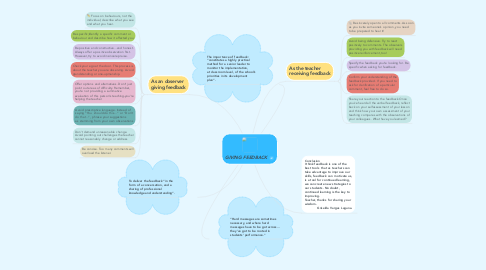GIVING FEEDBACK
by Griselda Vargas

1. As an observer giving feedback
1.1. Focus on behaviours, not the individual; describe what you see and what you hear.
1.2. Be specific;Identify a specific comment or behaviour and describe how it affected you
1.3. Be positive and constructive...and honest. Always offer a positive observation first. However, try to avoid insincere praise.
1.4. Check your ego at the door. This process is about the teacher you are observing. Avoid grandstanding or one-upmanship.
1.5. Offer options and alternatives. Don’t just point out areas of difficulty. Remember, you’re not providing a summative evaluation of this person’s teaching-you’re helping the teacher
1.6. Avoid prescriptive language. Instead of saying “You should do this...” or “Don’t do that...”, phrase your suggestions as stemming from your own observations
1.7. Don’t demand unreasonable change. Avoid pointing out challenges the teacher cannot reasonably change or address
1.8. Be concise. Too many comments will overload the listener.
2. The importance of feedback: “constitutes a highly practical method for a senior leader to monitor the implementation, at classroom level, of the school’s priorities in its development plan”.
3. To deliver the feedback “in the form of a conversation, and a sharing of professional knowledge and understanding”.
4. “Hard messages are sometimes necessary, and where hard messages have to be got across... they’ve got to be rooted in students’ performance."
5. As the teacher receiving feedback
5.1. Be sincerely open to all comments.As soon as you invite someone’s opinion, you need to be prepared to hear it!
5.2. Avoid being defensive. Try to react positively to comments. The observers providing you with feedback will need positive reinforcement, too!
5.3. Specify the feedback you’re looking for. Be specific when asking for feedback.
5.4. Confirm your understanding of the feedback provided. If you need to ask for clarification of a particular comment, feel free to do so.
5.5. Share your reaction to the feedback.Once you’ve heard all the verbal feedback, reflect back on your selfassessment of your lesson and think how your own assessment of your teaching compares with the observations of your colleagues. What have you learned?
6. Conclusion I think feedback is one of the best tools that as teachers can take advantage to improve our skills, feedback can motivate us, is a tool for continued learning, we can create new strategies to our students. No doubt, continued learning is the key to improving. Teacher, thanks for sharing your wisdom. Griselda Vargas Laguna.


